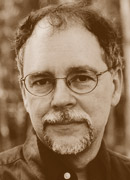
Gregory Maguire has written many books for children and other novels for adults (here is
our 2004 interview with Maguire for
Mirror, Mirror), but without question, he's best known for his Wicked Years series and its first book,
Wicked, in particular. If you are one of the few who hasn't yet heard about it, or about the wildly successful Broadway adaptation,
Wicked is a radically different retelling of
The Wizard of Oz from the point of view of Elphaba (the Wicked Witch of the West).
Kirkus raved, "[a] captivating, funny, and perceptive look at destiny, personal responsibility, and the not-always-clashing beliefs of faith and magic. Save a place on the shelf between
Alice and
The Hobbit ? that spot is well deserved."
The next two books in the series, Son of a Witch and A Lion among Men, tell the stories of Liir, Elphaba's son, and Brr, the Cowardly Lion. Now, Out of Oz, the fourth and final volume in the series, finds Oz at war, Dorothy Gale returned to Oz through an earthquake, and Rain, Liir's daughter and Elphaba's grandchild, learning the truth about who she is. Booklist praised, "A worthy conclusion to an imaginative and emotionally searing cultural phenomenon....nobody does fractured fairy tales better than Maguire." Out of Oz is majestic, dark, funny, and truly moving, and ends one of the most remarkable fantasy series of our time.
÷ ÷ ÷
Jill Owens: After reading Out of Oz, I went back and reread the other Oz books, and it was impressive to me how much the whole series feels seamlessly plotted out. How much did you have in mind when you started?
Gregory Maguire: When I began Wicked, I really thought of it entirely as a one-off, as the English say. There was no intention that there should ever be a follow up, because the subtitle was The Life and Times of the Wicked Witch of the West. She was dead and gone, as the book says, at the end. It's really problematic to try to write a sequel of a book about a character after she's died on the last page. [Laughter]
After about eight years, after the book was published and had become surprisingly a kind of cult favorite early on, when the play opened and then the readership quadrupled of the book, people began to write to me in ever greater numbers. Not just about the play ? of course they would write about that ? but also about the book, because more people had been driven to the book. They said, "We want to know what happens." So, I thought, Well, the subtitle does say The Life and Times of the Witch. It doesn't say the Life of the Witch, it says the Life and Times of the Witch.
There is a certain belief that dates back at least to the Puritan age, in this country, that a person's times extend to the third generation. They extend to as long as anybody can remember and be affected by how they lived their life. So, one's life and times actually is a five-generation span. It begins with the grandparents, because you can remember your grandparents to some extent, or at least your parents, who were affected by them. And it extends to your grandchildren.
Beyond that, the effect is too diffuse, unless one of your grandparents is the King of England, or something like that. So, I decided it wasn't inappropriate to have a sequel to Wicked, since Elphaba did have a son and the son had been in the book. He was only 14 at the end of Wicked. Once I realized that, I wrote the sequel, even though I didn't yet know there was going to be a series. I just thought there was going to be a matching pair of volumes.
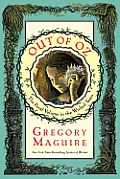 I nonetheless continued to sow into the manuscript and the narrative little bits and pieces that I knew had meaning, and so that some people who were familiar with the L. Frank Baum novels would get a little Starburst jolt of sugary sourness when they came across them. But they were so small that if the reader didn't get them, they wouldn't notice that they weren't getting them.
I nonetheless continued to sow into the manuscript and the narrative little bits and pieces that I knew had meaning, and so that some people who were familiar with the L. Frank Baum novels would get a little Starburst jolt of sugary sourness when they came across them. But they were so small that if the reader didn't get them, they wouldn't notice that they weren't getting them.
There are also tiny nods to what happens in Wicked: The Musical. For instance, at one point in Son of a Witch, I have the 14-year-old boy named Liir, Elphaba's son, go to visit Glinda for the first time. Glinda sits in her parlor and flexes her ankle as a distraction as she's worrying over a problem. That was a little homage to the ankle of Kristin Chenoweth, who used to flex her ankle in her second entrance on stage.
Who would know that? Who would care about that? I cared about that. So, I put the ankle flexing in as an homage to Kristin. Similarly, I put in lots of homages to L. Frank Baum and his books. That gave me, therefore, a whole bunch of knots and loops to which I could attach further strands of plot that would all tug in the same direction if I ever decided to go on to a third and fourth book, which of course, I eventually did.
Jill: What did you call them? Starburst jolts...
Maguire: Of sugary sourness. [Laughter]
Jill: I got a lot of those, because I read most of the Oz books when I was a kid.
Maguire: Oh, did you really? Then you're unusual. You don't sound at all like you're the right age to have read those books. [Laughter]
Jill: Maybe not. They were probably just at the library in the town where I grew up. I haven't read them since, so I didn't remember them that well. But particularly in this last book, with Mombey and Tip and General Jinjuria, I would get those little Starbursts. I thought, "Oh! I have a clue where this is going."
Maguire: [Laughter] So, you knew! You're one of the few readers who knows the story of Tip. You knew what was coming.
Jill: I did. Because that was one of my favorite stories from the Oz books.
Maguire: Right. Well, that's of course one of the weirdest things ever, not just in the Oz books, but in the history of children's literature ? the emasculation of Tip, as it were.
I read that as a 10-year-old boy, with my legs crossed, simultaneously finding it horrible and wonderful. So, I didn't even have to invent that. L. Frank Baum gave it to me on a platter in 1904.
Jill: How did you decide to begin this book with the 1906 San Francisco earthquake?
Maguire: I knew I wanted to get Dorothy back to Oz, and I also knew that I wanted to play a little bit more vigorously with the fact that our cultural picture of Dorothy is less the drawing by W. W. Denslow in the 1900s original Wizard of Oz and much, much more, a picture of Judy Garland strapped into a bra-reducing corset of some sort, trying at the age of 16, full of hormones and a sexy throttle in her voice, to play a 10-year-old prepubescent girl. Just as, even as a boy, I knew Mary Martin playing Peter Pan was not a boy, I knew that Judy Garland was not 10 years old.
And I thought, we all know that, and that confuses us as kids watching the film. Just how smart is she? And how much is she playing around with what she knows and doesn't know? As a kid, I couldn't have verbalized it, of course. But I did know that wasn't a 10-year-old girl playing a 10-year-old girl. That was almost a woman playing a kid's earnestness. I wanted to play with that a little bit more.
Then I thought, okay, if she's supposed to be 10 in 1900, then by the time she got to be 16, which is what Judy Garland was, that would be 1906. What happened in 1906? And at once I remembered the earthquake. I actually think that one of the many times that Dorothy goes back to Oz in those first 13 Oz books, an earthquake is one of the things that sends her there. Whether it's the San Francisco earthquake, I don't remember.
But I thought, I don't have to look that up. I'm going to use the San Francisco earthquake because it's the right date. Then I can get Dorothy back into Oz and she can be 16; she can really be Judy Garland in Oz, and not a 10-year-old 4th-grader.
Jill: How did you think about writing Dorothy's character? Because she's so bizarre.
Maguire: [Laughter] She is.
Jill: Which is appropriate because she's the outsider. She's the one character that was not from the world of Oz. But she also manages to fit really well, as you were saying, both with the character from the movie and with the original books.
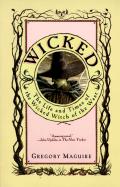 Maguire: Of all the fun characters to write, hers was almost the most fun, because I really did amplify the contradictions in her character, and even the Ozians find her bizarre. When she starts to be earnest, they run retching to the nearest ravine. A lot of people feel that way about earnestness. I'm a comic writer, in some ways, and a comic person when I'm up at a podium, in order to disguise the fact that in my heart I'm disgustingly earnest. I know that that's repulsive for people to deal with. So, I try to conceal it behind a skin of comedy and pathos. In a way, Dorothy became my avatar. I am Dorothy. Dorothy Gale c'est moi. [Laughter]
Maguire: Of all the fun characters to write, hers was almost the most fun, because I really did amplify the contradictions in her character, and even the Ozians find her bizarre. When she starts to be earnest, they run retching to the nearest ravine. A lot of people feel that way about earnestness. I'm a comic writer, in some ways, and a comic person when I'm up at a podium, in order to disguise the fact that in my heart I'm disgustingly earnest. I know that that's repulsive for people to deal with. So, I try to conceal it behind a skin of comedy and pathos. In a way, Dorothy became my avatar. I am Dorothy. Dorothy Gale c'est moi. [Laughter]
Jill: That actually makes a lot of sense. I was trying to describe the tone of these books to a friend the other day who hasn't read them, and I was trying to capture that comic part of it. I think I used the word "arch," but really, that's mostly just the dialogue.
Maguire: Right. The arch part is like the baseball cards flapping in the wheels of a bicycle. It gives character to what is going on. But it isn't why it's going on. It isn't the forward motion. It neither propels nor hinders the deep comedy and the deep tragedy of reconciliation and of loss, both of which move forward at the same time.
Jill: Yes, absolutely. And I like that you've also brought up earnestness, because that is underlying much of it, as well.
Maguire: It took me a long time before I felt I had the nerve to say it. But after about the five hundred thousandth person asked me, "Why do you think Wicked, the play, is so successful?" I said, "You know what, I think that the fact that it's about female friendship is only a small part of it. In my heart of hearts, I think the reason it's successful is that it is about an old-fashioned, early-20th-century, and very 19th-century notion that it is important to be good." We find that embarrassing to say. We may say that to our children, up until they're about nine. But we've become so self-conscious and so postmodern, that we perhaps, sometimes, can't even recognize it in ourselves, that we would rather be good than bad. And we can't talk about it.
How many times do you sit around at dinner and talk about being good? Well, in my house we talk about it all the time. But, in general, it's nothing that people talk about anymore. I think that the play finds a way to dramatize that as a persistent if disguised desire in the human breast, that we want in our lives to be good. We may not want to talk about it anymore. But we still desire to be good. I think the play makes it overt, and I really think that's part of why the play has been so successful. Nobody agrees with me. [Laughter]
Jill: I haven't seen the play, but I'll take your word for it. That comes up in the second and third books, too, Liir's story and then Brrr's story. They are both, in their own ways, trying to grapple with becoming better people, with becoming good. They're fighting their own demons of inadequacy and cowardice.
Maguire: Yes, they are. That was the fun of writing both those characters. There's no character in any of the novels nor indeed, I dare say, in any of fiction in history who was not made memorable because of their flaws.
These characters are as flawed as Elphaba, the Wicked Witch of the West, but they're flawed in a different way. She was flawed in part because she was powerful and misdirected. Whereas, they are flawed, both of them, because they are well directed but not powerful. I think they are more like the rest of us. We are more like Liir and like Brrr than we are like Elphaba ? most of us, at least. And so in some ways they were more humane. It was a more humane situation to write about them.
I was very proud of the plot of Son of a Witch in that the real question is, "You might have a mother who can cast spells, and defy the White House or the Kremlin or whatever it is you want to say, but if you yourself can't cast spells, what option do you have besides giving up?" That's really the question of that book. And the answer is solidarity.
Jill: Each of the books includes a love story, at least in part. But Out of Oz to me seemed largely to be about parental love, with the way Liir and Brrr and even Glinda feel about Rain. What made you want to focus on that?
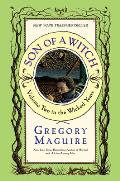 Maguire: If you go back to the previous question, as we were talking about the vital impoverishment of a central character, Rain is in some ways even more impoverished than Liir and Brr. In fact, I mean the reader to take her as almost autistic. She is deprived to the point of being deformed in terms of her capacity to attach to other people. It has been done for her own protection, but it has come close to ruining her.
Maguire: If you go back to the previous question, as we were talking about the vital impoverishment of a central character, Rain is in some ways even more impoverished than Liir and Brr. In fact, I mean the reader to take her as almost autistic. She is deprived to the point of being deformed in terms of her capacity to attach to other people. It has been done for her own protection, but it has come close to ruining her.
In the first draft or two, she was more of a milky little girl, much like Dorothy in the original Wizard of Oz. She was good and competent, but she let life happen to her. But the more that I looked at what I had written, the more I thought, no, her real achievement is not going to be destroying the power structure of the Emerald City, which effectively she does; it is going to be surviving. For some people the real achievement, the great achievement of their lives, is surviving to adulthood. And, therefore, the relationships that tend upon her, the important ones, are all more parental than they are romantic, because it's only when you have survived both the absence and the presence of your parents that you stop being a child.
Jill: I loved her focus on reading and language. And I love what Grayce Graeling says about all writing being a bit magical, how all words are a spell.
Maguire: It's funny you should center on that. Because in terms of writing, here's what I do, and here's why I write for that matter. I write in order to know what I think. As an Irish person, and as a Greek person, I'm terribly glib. I can make a good dinner table conversationalist. But if you asked me a question like, "What do you think about the financial policy of the EU?" I could not answer your question unless I sat down and wrote about it. It would take me a few days. Then I would give you a paragraph that would be my considered response.
When I write a book, I write very cleanly from page one to the last page. I hardly ever write out of sequence. Once it is done, I go back and read it to see what I was writing, to see what my concerns really were. And when I got to the Grayce Graeling section, I knew I had meant her as a bit of comic relief just before the chase of Rain began, when the book becomes more Tolkienesque ? the dark riders chasing Frodo across the moors, or whatever it is that happens there. But when I got back and read it, and I saw what was written in the inseams of that scene, as it were, I realized one of the central points of the book was about the power of language.
That was what was both good about Rain and bad about the Grimmerie, that all language has magic power. Sometimes you have to accept it, but sometimes you have to reject it. And you came right to it. You saw that thing that Grayce Graeling says that she did not say in the first draft in her scene. I went back and I put that in, because I didn't realize it until I got to the end ? and I saw what the various relative weights of the scenes added up to and what they implied ? what I thought the book was about.
Then, I thought, Well, this is really the perfect place I have to make that statement. So, there it was.
Jill: You mentioned, just now, the Tolkienesque nature of the chase scene. At the end of the third book, in the author's note, you mention that you had accidentally taken a piece from The Dark Is Rising, which is another book I love.
Maguire: Oh, that's right. [Laughter] I forget if had to explain what it was. It was about Mr. Boss kind of being in thrall, having been put someplace against his will and being left there, abandoned there, not just by anyone, but by a magician. That's also what happens to a character in The Dark Is Rising. The Walker, I think he's called.
Jill: It ruins the Walker.
Maguire: It ruins him, yes. Mr. Boss is not so ruined though. [Laughter]
Jill: No, he's not. He's managed to rally back.
What do you think of as your influences, other than these books we've already talked about?
Maguire: If I had the time, I would almost prefer to answer that by email, because there are so many. There are definitely books that you read that carry a tone. You might be reading some fiction that has nothing to do with fantasy, but you think, if I just had a little vial with a cork on it, I would want to capture some of what that book feels like and then put that here.
Here's a sample of what impacted me with Wicked. Of course, the deepest impact I didn't realize until the book was done, and that was The Once and Future King. That was the impact of the audacity of saying, "I can take a story that everybody knows and tell it again as if nobody has heard it before, and I can do it in the way T. H. White did it with, I hope, intelligence, beauty in the writing, with comedy and moral heft. And I need apologize to no one about why I'm doing this."
I didn't realize that. I didn't see that parallel until actually the book was out. But once I saw it, I said, "Oh, yes. Of course The Once and Future King was one of my favorite books as a teenager." I liked it far more than Tolkien. And of course, it too became a famous musical, Camelot. [Laughter] So, that was very nice.
But also before I even began to write Wicked, I read Angle of Repose by Wallace Stegner.
Jill: I've never read it.
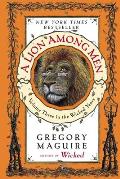 Maguire: Oh, it's wonderful. It's about a very strong-willed woman in the dark wilds of Colorado or Wyoming a century before Brokeback Mountain, but with some of the same feeling of hardship and emotional deprivation.
Maguire: Oh, it's wonderful. It's about a very strong-willed woman in the dark wilds of Colorado or Wyoming a century before Brokeback Mountain, but with some of the same feeling of hardship and emotional deprivation.
And I thought, I want that to be part of what the fourth section of Wicked is about when Elphaba goes to the castle. I want it to feel like that. I want it to feel like the hard American mountainous West even though culturally, it feels more like the Himalayas, Uzbekistan, and places like that.
Then when I got to Shiz, the university of section two, I wanted to evoke almost all of the novels of E. M. Forster with a little bit of Brideshead Revisited. Indeed, my character of Nanny, is a direct relative of Nanny Hawkins, in Brideshead Revisited, who never dies. She's always alive. She's still alive at the end up there and that's where I left my Nanny. I love the fact that I was just keeping her alive forever.
Occasionally the references are oblique, but right down to the level of sentence pattern, there are some sentences that are patterned on beautiful important sentences in other books. I think ? I don't have Out of Oz right in front of me, but I think in the penultimate section where Tip and Rain are standing revealed to each other in the parlor and have to take leave of each other ? the last two sentences of that book, to my mind, intentionally evoke the last two sentences of A Passage to India where Fielding and Aziz approach each other, but it isn't the time in the history of India and England for them to be lovers effectively, or to be friends.
I didn't go back and reread the lines from A Passage to India because I didn't want to parrot them that much, but I certainly knew that when I was getting to the end of that scene that, in my own mind, that's the kind of power I wanted to evoke out of that scene. I just borrowed from my great heroes.
Jill: I think that it's fascinating that you are conscious of influence down to a sentence level, and I was going to ask you how you thought about your prose on that level, in general?
Maguire: I have done a lot of speaking from podiums, in terms of literature education and a little bit of art criticism, and I've even given a few sermons from time to time. And because I tend to be prolix ? as you can tell, as we're now running into minute 32 ? I always have to time myself very carefully so I can fit in a timeframe. I'm very proud of fitting exactly into the timeframe that's required.
That means that I have spent lots and lots of time reading speeches with a stopwatch to make sure that I got them exactly. I would be the rare speaker who would end exactly on time and yet not have to cut anything off or ruin the effect that I was trying to build. That practice of reading speeches aloud taught me that your ear is much smarter than your eye. Your ear can tell when you've got a boring sentence, and your ear can tell when a sentence is too long.
Mind you, I couldn't read all of the book out loud. But whenever I got to a section that seemed entirely too turgid, or possibly I was revisiting background information too often, I would read it out loud and that would correct my pose on the sentence level when it was hard to do intellectually any other way.
Jill: There's a paragraph I loved on page 248 in my galley which says,
The further on we go, the more meaning there is, but the less articulable. You live your life and the older you get ? the more specificity you harvest ? the more precious becomes every ounce and spasm. Your life and times don't drain of meaning because they become more contradictory, ornamented by paradox, inexplicable. Rather the opposite, maybe. The less explicable, the more meaning. The less like a mathematics equation (a sum game), but more like music (significant secret).
That paragraph seemed to sum up an entire philosophy of life pretty well.
Maguire: [Laughter] Yes, I know. I do think about my life like that, but it also sums up a philosophy of fiction, because there has got to be a reason why a person becomes a novelist instead of an artist of haiku. The reason has something to do with the music of words through time, of deep words through time.
There is a place for haiku, and I admire it, but there's also a place for Mahler's symphonies. You cannot just take the greatest eight measures out of a Mahler symphony and say, "Isn't Mahler great?" [Laughter] You have to have the whole thing. It has to unfold through time, and it becomes more wonderful and more mysterious, not the longer it is ? it isn't a question of length ? but the more complexity it has. Indeed, the less coherence you find in something, the more possible it is that there's a significant secret embedded in it.
Jill: How does it feel to be done with this huge, vast, complex world that you have created over so many years?
Maguire: I'm 57, and I've been a novelist for 32 years in one way or another, if you count my novels for children, and I do. So, I could retire. I might have a novel or two left in me because the publisher says I still owe them one according to a contract, but I could retire.
Current argot is "encore career." You don't go to a second career, even if you're going to work at the 7/11 or volunteer at the hospital gift shop. You go to your encore career.
I like that phrase and I'm thinking about it. I'm wondering, maybe I won't be done. Maybe I'll be a novelist until my dying day. But I do think novelists' lives have a certain shape, too. Most novelists are done doing their significant work by the time they're my age. Maybe I'll have an encore career writing for the stage or writing haiku. Maybe I'll finally learn how not to be prolix. Or maybe I will go work in the hospital gift shop. [Laughter]
I don't know. The not knowing is frightening, like all change in life, but invigorating, as well.
I spoke to Gregory Maguire by phone on October 31, 2011. He was at his home in Concord, Massachusetts, and since he had power during the early snowstorm, he'd invited over "various strays and waifs from towns around us." He said, "We're little bit like a hotel. [Laughter] But I hope it's not like the Hotel California, where people check in and never leave."